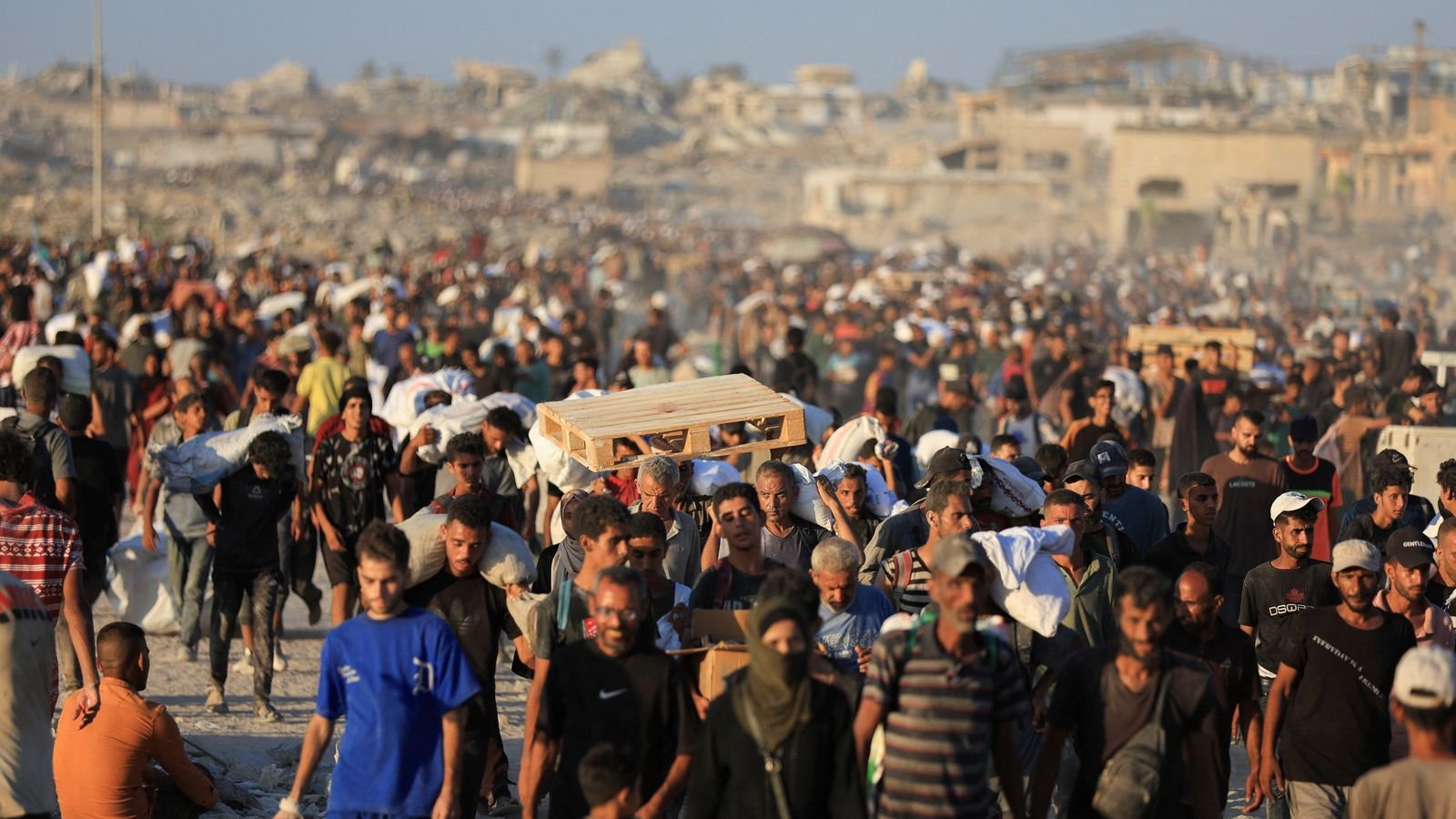There has been a significant shift among G7 countries recently.
First, France, then the UK and now Canada have all said they plan to recognise a Palestinian state.
But what does recognising a Palestinian state mean?
Under the Montevideo Convention of 1933, there are several criteria before Palestine can be recognised as a sovereign state under international law.
The process requires the state to have:
A permanent populationA defined territoryAn effective government and international relationsFormal diplomatic processes including embassies, ambassadors and treaties
Out of the 193 United Nations member states, almost 150 already recognise Palestine as a state as of March 2025.
Watch Mark Carney announce Canada’s decision here…
How does the UN admit new member states?
Countries usually apply to the United Nations secretary-general, who sends it to the Security Council for initial assessment and a potential vote.
Approval requires at least nine votes in favour and no vetoes by the UK, US, France, Russia or China.
If the Council approves the request, it goes to the General Assembly for approval, where a two-thirds majority is needed.
A state can’t join the UN without the backing of both the Security Council and General Assembly.
What happened to the Palestinian application in 2011?
The Security Council looked at the application for several weeks to see if it satisfied the conditions for membership.
However, it was unable to reach a unanimous position, so a formal vote never took place.
Even if it had cleared this step, the US said it was planning to veto the application.
Why have the UK, Canada and France acted now?
Sir Keir Starmer says the time to recognise Palestine is now, as it will have the highest impact, as the hope of a two-state solution – a “secure” Israel alongside a “viable” Palestinian state – is at risk.
He says it is part of an “eight-part plan”, already discussed with France and Germany, but denies it represents a U-turn after pressure from Labour MPs, saying instead it was always part of the plan to recognise Palestine.
Emmanuel Macron has been leaning towards recognising a Palestinian state for months as part of a bid to keep the idea of a two-state solution alive, despite pressure from other countries not to do so.
Canada’s Mark Carney has long said it would only recognise a Palestinian state at the conclusion of peace talks.
However, he warned that the reality on the ground in Gaza, and the starvation crisis, means “the prospect of a Palestinian state is literally receding before our eyes”.
Israelis tell Sky News what they think of Starmer’s decision…
What is a two-state solution?
Recognising Palestine presupposes support for a two-state solution.
A two-state solution would see an independent Palestinian state established alongside the existing state of Israel.
The Palestinians seek an independent state in the occupied West Bank, annexed East Jerusalem and Gaza, territories that have been occupied by Israel since the 1967 Six-Day War.
Israeli Prime Minister Benjamin Netanyahu and most of Israel’s political class have long been opposed to Palestinian statehood, and argue that it would reward militants after the 7 October attacks launched by Hamas in 2023.
One of the biggest obstacles to a two-state solution would be deciding what the borders of a potential Palestinian state would be.
Many believe they should be the same ones that existed before 1967, but since then, increasing numbers of Israeli settlements have been established inside the West Bank, with around 600,000 Israelis now living there and in Occupied East Jerusalem.
How have Israel and Palestine responded?
Perhaps unsurprisingly, Israel has condemned the recent flurry of decisions.
The country’s foreign ministry said in a post on X: “The shift in the British Government’s position at this time, following the French move and internal political pressures, constitutes a reward for Hamas and harms efforts to achieve a ceasefire in Gaza and a framework for the release of hostages.”
Israel’s Prime Minister Benjamin Netanyahu has strongly condemned France, saying recognising a Palestinian state now would be a “launch pad to annihilate Israel – not to live in peace beside it”.
The country’s foreign ministry also said Canada’s decision was “a reward for Hamas”.
Meanwhile, Palestinian President Mahmoud Abbas in Jerusalem expressed “thanks and appreciation” to the French leader.
The Palestinian Authority, which has limited power in the occupied West Bank, called Canada’s decision “courageous and principled” but made no mention of the conditions Mark Carney included.
What about other countries?
In response to France’s decision, the German government said Berlin still backs a two-state solution but won’t recognise a Palestinian state for now,Australia’s prime minister, Anthony Albanese, described the situation in Gaza as a “humanitarian catastrophe” and said his country is “committed to a future where both Israeli and Palestinian people can live in peace and safety within secure and internationally recognised borders”.Italy’s foreign minister said the recognition of a Palestinian state must also recognise Israel as a state.Spain, which already recognises Palestinian statehood, welcomed Mr Macron’s announcement. Prime Minister Pedro Sanchez wrote in a statement on X: “Together, we must protect what Netanyahu is trying to destroy. The two-state solution is the only solution.”Saudi Arabia’s foreign ministry also said it “commends this historic decision” and called on other countries to take “similar positive steps”.
